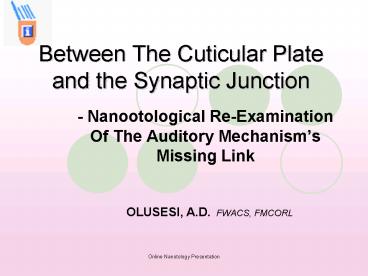Between The Cuticular Plate and the Synaptic Junction - PowerPoint PPT Presentation
1 / 30
Title:
Between The Cuticular Plate and the Synaptic Junction
Description:
IHC to Afferent VIII = 140 . OHC to Afferent VIII = 1 m. OHC to Efferent VIII = 190 . Afferent NT = Glutamate. Efferent NT = A/chcoline, etc. Synaptic Gap ... – PowerPoint PPT presentation
Number of Views:37
Avg rating:3.0/5.0
Title: Between The Cuticular Plate and the Synaptic Junction
1
Between The Cuticular Plate and the Synaptic
Junction
- - Nanootological Re-Examination Of The Auditory
Mechanisms Missing Link
OLUSESI, A.D. FWACS, FMCORL
2
Nanootology - Concept
- Submicron view of otology
- Basically nanotechnology applied to otology
- Fall out of Richard P Feynmans 1959 lecture
- Coined in 2002 October in SA
- Potentials in unsolved otological problems
- Visualization nanoendoscopy
- Monitoring nanoaudiology
- Manipulation nanosurgery, nanootology
- Targeted therapy
3
Architecture of Sensory System
4
PROBLEM DEFINITION
- Hair cells sensory receptors cells
- Detect sound acceleration stimuli
- Cochlear hair cells function
- Mechano electrical transduction
- Electro-chemical transduction (NT release)
- Electro-mechanical transduction (Electromotility,
OHCs only) - Mechano-electrical Electro-chemical
transduction in response to sound stimulus - ?HOW ?? MECHANISM
5
Research Questions
- What events occur between the moment the inner
ear fluid displacement secondary to movement of
stapes to sound stimulus occurs, and the release
of neurotransmitters from the hair cell primary
auditory neuron synaptic junction?
6
Methodology
- Advances in neurobiology, molecular biology,
hearing research, and nanotechnology reviewed
from scientific and medical databases - Current knowledge of auditory neuroanatomy
compared and submicroscopic anatomy extrapolated
in view of new knowledge of inner ear
ultrastructure
7
Cochlear Anatomy The Cochlear Partition
Organ of Corti
8
Transduction Evolution of Theories
9
Hair Cell Microscopic View
10
Actual Micro scale Ciliary Finding
11
Hair Cells Versus Normal Cells
12
Hair Cells - Microanatomy
13
Hair Cell Nanoanatomy Evolution of Tools
- Light Microscopy
- Transmission electron microscopy
- Scanning Electron Microscopy
- Patch Clamp
- Optical Tweezers
- Atomic Force Microscopy
- Soft X-ray Microscopy
14
Hair Cell Nanoanatomy Current Tools
15
(No Transcript)
16
Hair Cells Nanoanatomy Stereocilia
17
Hair Cell Membrane Plasma Organelles
Transmembrane Protein
Outer
Inner
18
Hair Cell Nanoanatomycontd.
- 1 2 microns thick
- Supports rootlets of stereocilia
- Contains actin myosin
- OHC intracuticular region
- Rich in mitochondria ER
Cuticular Plate
19
Hair Cell Nanoanatomycontd.
- Small membrane-enclosed Bodies
- Origin Fusion or Budding
- Exocytosis followed rise Ca2i
- Contain neurotransmitter(s)
Vesicles
What is the link between Ca2i and Exocytosis???
20
Mechanism of Exocytosis
21
Ca2 Modulation of Exocytosis
Actin Filament
Anchored Vesicle
VAMP
Ca2i
Ca2i
22
Vesicle Associated proteins
- Restriction of Mobilization
- Synapsins (1a, 1b, IIa, IIb)
- Vesicle Transporter
- Rab3a Rab3b
- Vesicle Docking Fusion
- NSF
- Soluble NSF-attachment protein (SNAP)
- Synaptobrevin ( SNAP-25 Syntaxin)
docking/fusion complex at synapses - Exocytosis
- Synaptotagmin, Synaptophysin
23
Cochlear Hair cells Synaptic Proteins
Peculiarity
- Possession of synaptic ribbon -highly specialized
structure to which the synaptic vesicle must dock
before exocytosis, - Ability to maintain high sustain release of
neurotransmitters, and - Lack of synaptophysin and synapsin - two
proteins that feature prominently in exocytosis
of CNS vesicles.
24
(No Transcript)
25
Cochlear Hair cells Synaptic Proteins -Fact Sheet
- Syntaxin 1, the predominant syntaxin in CNS
synapses is also expressed in hair cells - Vesicle associated membrane protein (VAMP)1, but
not VAMP3 associated with ribbon synapses of
retina, is expressed in hair cells, and - SNAP-25, syntaxin1, and VAMP1 do not appear to be
concentrated at the base of the hair cells where
synaptic contacts are made, but rather found
throughout the cell - - Saffiedin Wenthold, 2003
26
Mechanism of Ca2 Influx in Exocytosis
Ligand-Gated Channel
Voltage-Gated Channel
Stretch/Pressure-Gated Channel
Phospho/dephosphorylation Channel
Calcium Channel Open State
27
Unanswered Question
How does ca2 influx translate Into intracellular
Ca2 concentration around the vesicles?
Ca2
Ca2
Ca2
28
Synaptic Gap
- IHC to Afferent VIII 140Å
- OHC to Afferent VIII 1µm
- OHC to Efferent VIII 190Å
- Afferent NT Glutamate
- Efferent NT A/chcoline, etc
Synaptic Gap
29
Total Picture The Missing Link
Synaptophysin
CAM Kinase II
Rab3c
SYNAPTIC VESICLE
Synapsin
Cytoskeleton
Docking Fusion
Transport
Plasma membrane
Ca2 Channel
30
The Ultimate Query
- Is the entire reason for creating a highly
sophisticated cochlear partition to eventually
achieve electro-chemical transduction?































